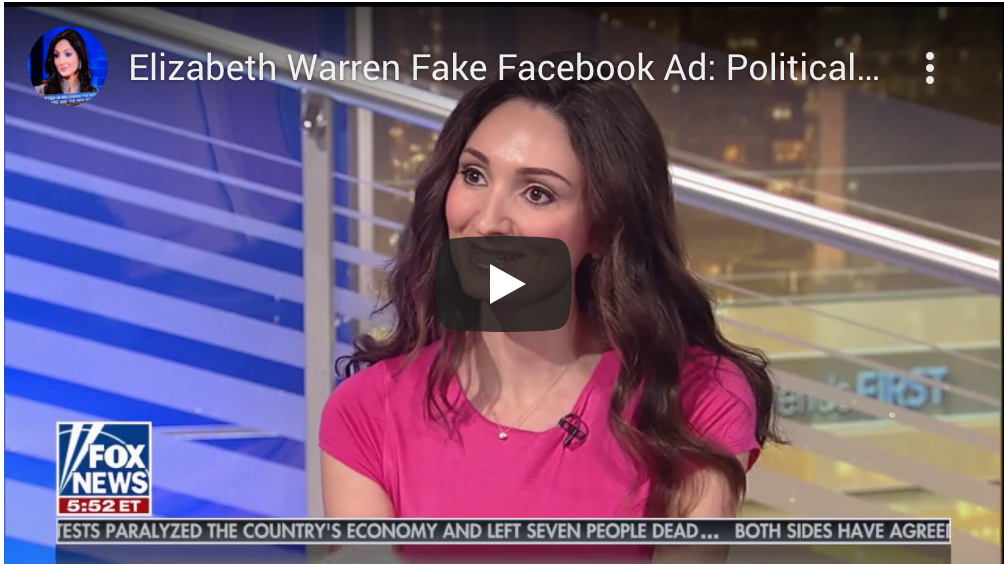SOCIAL MEDIA AND POLITICS
Social media is a critical component of every political advertising campaign to win and influence public opinion.
Paid Facebook ads have always been a critical tool for political campaign managers to target prospective voters. However, Elizabeth Warren recently dared Facebook with an intentionally false ad.
In a recent Fox News segment, Social Media Strategist Kris Ruby of Ruby Media Group discussed anti-conservative bias in big tech. Click here to watch the full segment.
Should Google, Facebook, or Twitter control and moderate political speech?
If you turn on cable news today, you will see a slew of lower third chyrons that say things like “the dangers of political ads on the web.”
But just how dangerous are these political ads on social media?
A 2020 Pew Research Center survey found that 54% of Americans said that social media companies shouldn’t allow any political ads.
Yes, political ads spread misinformation. But how is this any different from the political ads that run on television that also spread misinformation?
Why are we asking for a new set of rules for digital advertising that we have not demanded from traditional advertising?
SOCIAL MEDIA POLITICAL AD POLICY
Political advertising in the digital age.
Online social media platforms are now facing growing pressure to stop running political ads that show false or misleading claims ahead of the 2020 U.S. presidential election.
Politicians, pundits, digital advertisers, marketers, and the general public have debated whether there should be stricter regulations around political advertising on social media.
Politicians run political ads on social media in a variety of rich media formats including:
- Retargeted videos
- Sponsored Snapchat geo-filters to targeted locations
- Boosted and sponsored posts on Meta
- TikTok sponsored content
- Social Audio & Podcasting
But some politicians are turning to new methods of social media advertising to reach voters.
Political NFTS: Political campaigning in the metaverse
How will NFTs change the future of politics?
Using NFTs for political donations
Political candidates looking to attract a younger voter base are using NFTs for political donations.
Millennials are crypto-conscious consumers and Bitcoin is an important political talking point for their fight for digital freedom and sovereignty.
Voters have changed media consumption patterns and spend more time on social audio platforms like Twitter Spaces hobnobbing directly with politicians on Twitter Spaces.
Politicians are leveraging social audio to fundraise and encourage listeners to donate in Bitcoin or cryptocurrency with a link to their campaign.
How will other political candidates use blockchain for fundraising?
Metaverse marketing will not only impact corporations; it will impact political campaign spending, too. Politicians need to figure out how to campaign in the metaverse.
Twitter Spaces will become an increasingly important platform to reach new voters. However, it is not a replacement for cable news.
Political NFTS have the ability to attract a younger audience, but they are riddled with regulatory concerns. The FEC approved political cryptocurrency donations eight years ago. Trends and emerging marketing tactics should never replace the fundamental tried and true marketing you know will work.
HISTORY OF POLITICAL ADVERTISING ON SOCIAL MEDIA PLATFORMS
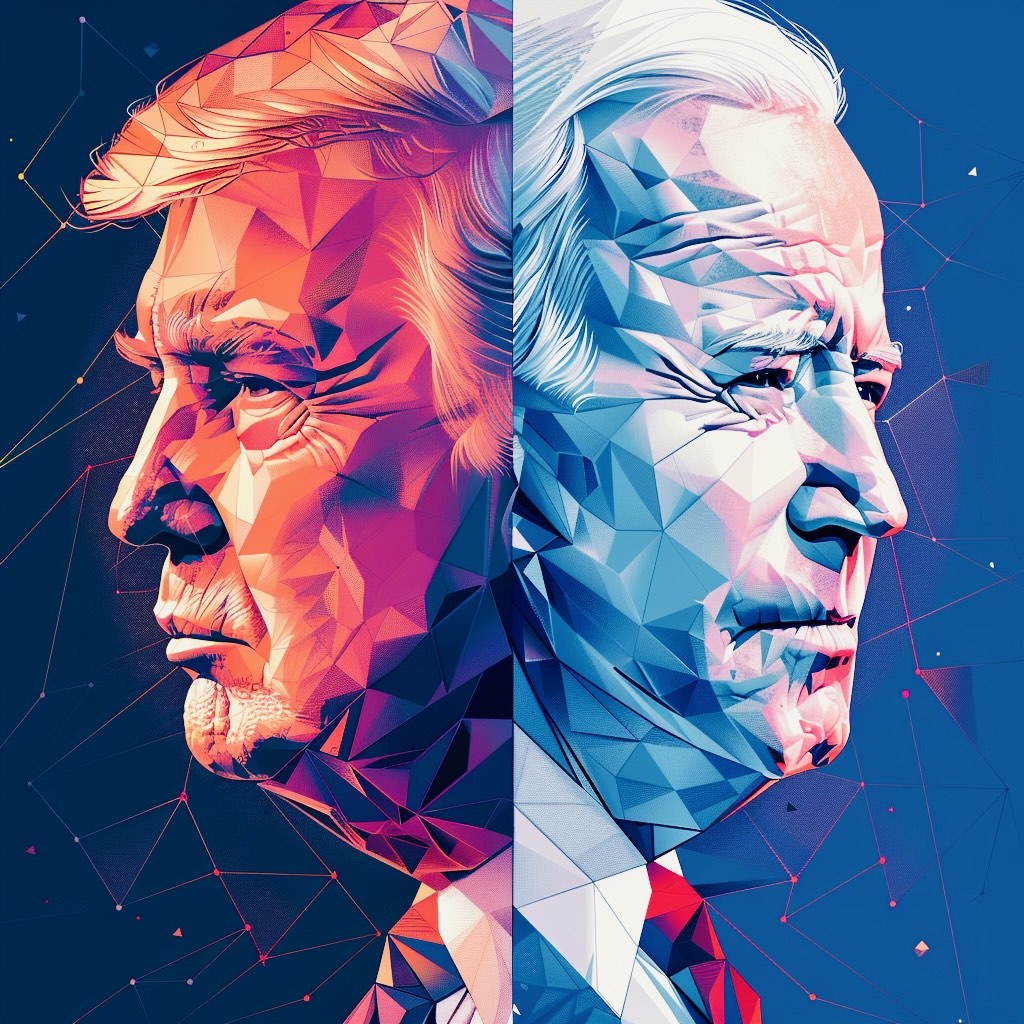
The role of social media in politics
Digital advertising on social media is a critical tool for candidates to find donors and sway voters. 2020 Presidential candidates have reportedly spent almost $100 million to date on digital advertising on social media platforms.
Donald Trump reportedly spent the largest amount of money on digital advertising among 2020 presidential candidates.
U.S. Presidential election marketing is a critical topic to see who is winning in the court of public opinion on social media in the digital arms race.
A candidates approach to social media marketing can reveal deeper insights into how innovative they are.
Is it really big-techs role to limit and control how campaigns can reach voters?
How do you use social media for political advertising?
Online advertising is much more precise in comparison to broadcast television ads in terms of the ability to reach the end-user. This is the magic of digital advertising vs. traditional marketing.
Why should we kill that just because politicians want to take a stance?
Critics claim that on TV, political ads are highly regulated. However, they still contain falsehoods despite the regulation.
Why should political ads on social media be treated differently than political ads on television? Why the double standard?
“In the United States, the Communications Act prevents broadcast stations from rejecting or censoring ads from candidates for federal office once they have accepted advertising for that political race, although this does not apply to cable networks like CNN, or to social media sites, where leading presidential candidates are spending millions to target voters in the run-up to the November 2020 election.”
Broadcasters must adhere to The Federal Communications Act, which states they have no power of censorship over the material broadcast.
READ: The FCC and Speech
Lies and half truths have always been a key feature of political campaigns since the dawn of time. So, why the rush to control digital advertising on social media platforms?
FACT: Digital advertising works better than traditional media to target a specific group of people.
Politicians are afraid of the power of micro-targeting. They don’t want to be blamed if someone wins that was not considered the popular choice, which is why there is an outcry from congress as to why targeting should be hindered for political candidates.
SOCIAL MEDIA POLICY: NEW RULES FOR POLITICAL ADS
Political Ads on social media platforms: the definitive guide
Digital ads on social media platforms are not subject to the same disclosure regulations that apply to traditional television and political ads on radio and other traditional media vehicles. However, civil society organizations are putting pressure on social media platforms to ban political ads.
Political Ad Policies
So, how are tech companies handling misleading claims in political ads?
Here is a rundown of the current political advertising policies of big-tech giants.
FACEBOOK POLITICAL AD POLICY
Politicians are exempt from third-party fact-checking, meaning politicians are allowed to run ads with false claims. Elizabeth Warren criticized this policy and said it could cause a spread of misinformation. She ran a false ad on Facebook to highlight this issue, which I recently discussed on Fox News. Mark Zuckerberg has repeatedly said it is not his role to censor political speech. However, Facebook does fact-check content from political groups.
Facebook now requires mandatory disclosures so people know who is running political ad campaigns. Facebook recently tightened rules for US political advertisers ahead of the 2020 election. Political advertisers are required to display a confirmed organization label to show government-issued credentials. Any advertiser running political ads is also required to post their contact information.
Facebook requires political advertisers in the U.S. to:
- Submit a U.S. mailing address and identity document
- Supply a phone number, business email, and website
- Submit a federal election commission ID number, tax registered ID number, or government website domain.
GOOGLE POLITICAL AD POLICY
Google will limit audience targeting for election ads to age, gender, and location at a postal code level. Political advertisers can no longer target ads using data such as public voter records and general political affiliations such as right-leaning, left-leaning, or independent. Google is also restricting advertisers’ ability to micro-target political ads on search and YouTube. Google is also getting rid of the customer match feature, which enables campaigns to match profiles with voter data.
All political ads and destinations must comply with local legal requirements. This includes campaign and election laws and mandated election “silence periods” for any geographic areas they target. In some regions, election ads may run only if the advertiser is verified by Google. In these regions, election ads are subject to disclosure requirements and targeting restrictions.
Election ads in the United States may run if the advertiser is verified by Google.
Will Facebook (META) follow suit by getting rid of custom audiences? I don’t think so, considering this is part of the powerful engine that drives ad revenue for the platform. They have too much to lose by doing that.
Google: Election Advertising Verification
TWITTER (X) POLITICAL AD POLICY
Twitter recently banned all political ads that include content that references a political candidate, party, election, or legislation. The company also said it will not allow ads that advocate for a specific outcome on political or social causes.
Twitter is considered the smallest player within the political online advertising space. Political ads do not make up a substantial portion of Twitter’s revenue, therefore this move is less of a risk for Twitter than it is for Facebook or Google.
“In 2023, X relaunched Ads Transparency for the Digital Services Act (DSA). For ads served in the EU, this Ad Repository will include the following: Advertiser, Funding Entity, the Advertiser’s Main Targeting Parameters for the advertisement, Impression, and Reach of Ad to provide transparency around advertisements on the platform. X is providing an archived version of Ads Transparency Center (ATC) data from all Political ads that ran between May 24, 2018 and November 22, 2019 and Issue ads that ran between August 08, 2018 and November 22, 2019.”
DOWNLOAD: X Political Ad Library
DIGITAL MARKETING FOR POLITICS
The pros and cons of restricting political ads on social media
PROS
- Proponents of limiting campaign microtargeting believe it could curtail election interference and misinformation.
CONS
- Could hurt less well-known candidates
- Could suppress voter turnout
- Control all digital political speech.
As big tech companies overhaul their political ad policies in favor of limiting politicians’ ability to target voters through microtargeting, this will potentially hurt smaller campaigns that rely on microtargeting to reach new audiences. It could essentially wipe out any of the small players from even having a chance to compete. It is actually going to rig the system in favor of only those with large pockets.
Not every political campaign can afford television ads. Many can only afford digital ads with smaller budgets. If we remove that option, we are essentially killing off the ability for new players to enter into a free-market political race.
Google, Twitter, and Facebook opened up archives of political ads to the public
Election Integrity and public policy have become a trending topic in Silicon Valley as social media companies begin to fully grasp their role in U.S. elections and democracy at large.
In an attempt to show public transparency around political advertising on social media, Facebook and Google launched databases that allow the public to monitor politicians’ digital advertising media spend.
In Google’s Political Advertising transparency report, you can search through every candidate ad in the U.S. The data also shows ad spend by U.S. state, advertiser, and keyword.
Political Advertising on Google Transparency Report
This is not only helpful for election integrity, but also for a GOP PR or Social Media Firm to be able to see the ad creative of a politician’s opponents during the election cycle.
This data can be leveraged for opposition research in any social media marketing political campaign.
Does Google have a searchable political ad library?
Yes, Google released a searchable database of U.S. political ads. You can drill down into the data to see the ad spend by U.S. state, advertiser, and a library of the creative for each ad. The database shows every candidate ad in the U.S. but it does not show issue ads created to influence public opinion about specific policy.
Does Facebook have a searchable political ad library?
Every political and social issue ad that runs on Facebook and Instagram is stored in a searchable Facebook Ad Library for seven years. Facebook has also recently released a database called the Facebook Open Research and Transparency.
Facebook Open Research and Transparency (FORT) includes targeting information of more than 1.65 million ad targeting data sets including the ads on social issues, electoral issues, and political Facebook ads during the 3 month period prior to Election Day in the 2020 U.S. election.
Will government regulation affect growth?
Limiting how narrowly politicians can target voters and the types of ads politicians can run on social media platforms is not the real issue. The question of government regulation looms over the digital advertising ecosystem.
The biggest threat to Facebook and Google will be who wins the next political election in 2024.
Believe it or not, the greatest threat to digital ad growth is politics.
Google controls 90 percent of the market and has no real competition. AI search is now changing the landscape, with rivals like Perplexity AI and Bing eating into their market share.
Growth has largely remained stagnant, and many of these digital ad platforms are not growing as quickly as they used to.
Acquisition as a service
The only way they will grow is to buy up smaller faster-growing social media networks (like TikTok).
The prospect of regulation may introduce a substantial hurdle for ad growth. If these tech companies are broken up in an antitrust probe, this would be a disaster for profitability.
POLITICAL ADS ON SOCIAL MEDIA: KRIS RUBY’S FINAL THOUGHTS
Microtargeting enables politicians to reach specific groups of individuals through digital advertising. It has come under fire by critics because it enables politicians to target narrow groups of voters. Critics say this has to potential to manipulate the political debate and upcoming elections.
However, microtargeting on digital ad platforms is the key to rapid growth of digital advertising. This is, why so many media buyers have shifted paid media spending to digital advertising in the first place.
If we limit the ability of the Internet to do what it is very best at, aren’t we censoring a powerful form of advertising?
We are telling people this type of advertising works so well that therefore we are going to limit your ability to use it.
What kind of message is that to send to consumers?
Imagine saying, this car drives too well, so, therefore, it’s unfair if it stays in the market. We are going to only give you the option to buy a slower car. We will remove the car from the road.
Why should one be penalized for the righteous advantage of knowing how to use digital advertising and deploy it to target voters and win elections? Social media as a strategic lever of growth is a competitive advantage and most. To remove it is to remove the fundamental nature of capitalism.
That is not manipulation, it is having a competitive advantage and skill set of how to effectively deploy digital advertising across multiple channels to win attention.
If we start to censor one’s ability to use these marketing vehicles as they were intended to be used, we are going down a very slippery slope.
And, if microtargeting is so controversial, then why has it not been removed in every other area outside of political advertising?
It enables anyone to target niche groups of people with tailored messages, not just politicians. It gives people the ability to narrowly reach their target audience and end-user.
That is not manipulation; it is good marketing.
SOCIAL MEDIA FOR POLITICAL CANDIDATES
Biden & Trump’s Social Media Political Campaign Strategy
During the pandemic, teenagers and first-time voters were sitting at home scrolling through their social media feeds. How did Biden and Trump use this period of time to attract a new base of voters through the new digital era?
Political candidates should use this time to strategically attract a new base of voters that have exhibited increased media consumption preferences on alternative media platforms during the pandemic.
If you want to reach millennial social-savvy digital media users, candidates should consider advertising and increasing spending on podcast platforms and social audio platforms like Clubhouse or Twitter Spaces to reach voters directly.
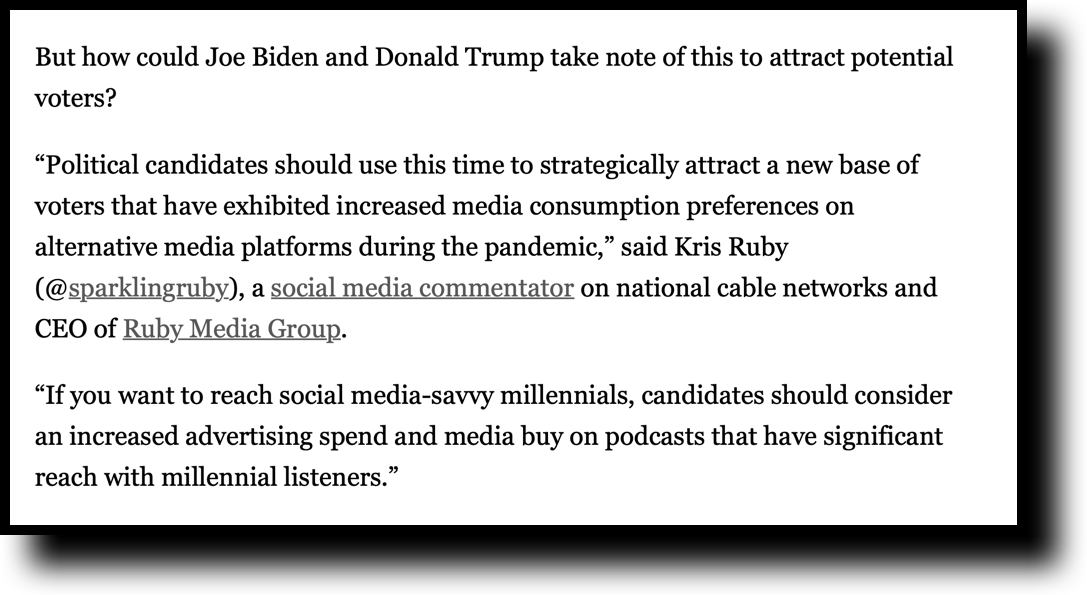
While some major podcast platforms have stated they will suspend political advertising on their platforms, there are still many other opportunities with smaller podcast platforms and indie networks to consider deploying dollars towards.
Podcasts are a great way to get into the hearts and minds of listeners and voters. They are extremely engaged with the content and can also listen to a podcast for up to one hour at a time.
What are the different types of social media tactics that political candidates use to benefit their campaigns?
The greatest challenge is the role of censorship on social media platforms. Section 230 of The Communications Decency Act and Trump’s Social Media Executive Order will also play an instrumental role in the future of social media marketing for politicians and free speech on the Internet. Political candidates should consider looking at other social media networks to deploy ad dollars towards those that are less well-known.
The growth of movement marketing is critical for political candidates on platforms like Telegram, Discord, or Signal.
Social Media Tip: Political candidates should create a channel on Telegram that voters can subscribe to.
Politicians must target their ads to deliver customized messages to niche audiences.
Targetting is not only about paid ad spend; it is also about choosing the right platform to reach the right audience.
Conservative candidates running for office should tap into the myriad of alternative social media platforms like Parler, GETTR, Truth Social, and Locals.

How could President Trump aka “The Social Media President” use his social media following to build up his 2020 re-election campaign, while avoiding the risk of a double-edged sword?
President Trump would need to consider building his social media following on alternative and rising conservative social media platforms like Parler. Twitter continues to censor Trump’s content, so that is akin to building a house with a shaky foundation that is built on quicksand.
Social media platforms are rented space. If Trump wants the biggest bang for his buck with ad dollars, it should be towards owned content, where he has control over the content and it lives on his own platform and can’t be pulled if the platform disagrees with it.
Trump’s social media following will not be his greatest challenge in the election; the pandemic is. He would be wise to listen to the political consultants and social media team he has hired and do what they recommend in this arena.
Is President Trump being censored or getting a boost from social media?
Trump was considered to be the first social media President. He used social media to communicate with Americans far more than any other President in history. That being said, it is possible that social media could both help him and hurt him. It helped him communicate with his base by cutting out typical media communication gatekeepers, which has fundamentally impacted the social media industry because of the precedent this set.
President Trump’s usage of social media has encouraged corporate executives to speak directly with consumers, which on the one hand is good, but on the other, it has created several problems without statements going through the normal PR approval process and ultimately leaves PR practitioners in a position where they are consistently cleaning up things that have been said rather than working alongside the executive to craft messages before public distribution or release.
The issue of social media censorship far surpasses Trump’s tweets. It is challenging to equate fact-checking of digital media platforms to social media platforms. What do both have in common? Bias.
Whoever controls the algorithm or fact check process controls what the facts are.
How could Biden and Trump use the next month before students return to college to promote their campaigns via TV ads and social media ads?
There is currently no indication students will be returning to college due to the pandemic. The statement that students will return to college in the fall is an assumption. It is hard to predict what will happen tomorrow let alone one or two months from now. If Biden and Trump want to use the next month to reach students, they should consider hosting more virtual campaign rallies.
Virtual conferences and webinars are the future, especially in B2B marketing. As a business owner, I would tune in to content that is relevant to my business if politicians organized that type of content: but that would require a robust content marketing campaign that takes into consideration the type of content millennials are searching for and the issues that matter most to them.
That starts with a very “you” focused campaign, rather than a “me” one.
To do content marketing right means understanding the pain points of your audience. This does not just mean campaigning to them, it means helping them solve those problems through solutions.
Millennials are jaded by political jargon that they feel includes decades of broken promises. They want to feel understood. Advertising is effective when there is trust in the product or brand that you are advertising.
Many Americans have lost trust in both political candidates. When you have that scenario, social media advertising can’t fix it. The only thing that can fix it is fixing the brand first and marketing the brand second.
It cannot and should not be the other way around or else you are paying for advertising that is more about the targeting than it is about the message.
- Step 1: Refine the message.
- Step 2: Rebuild lost trust in the brand.
- Step 3: Market the message and the brand.
Let’s hypothetically say that you were in charge of either Biden or Trump’s PR and Marketing team. How would you work with colleagues to attract voters from the 18-25 age demographic?
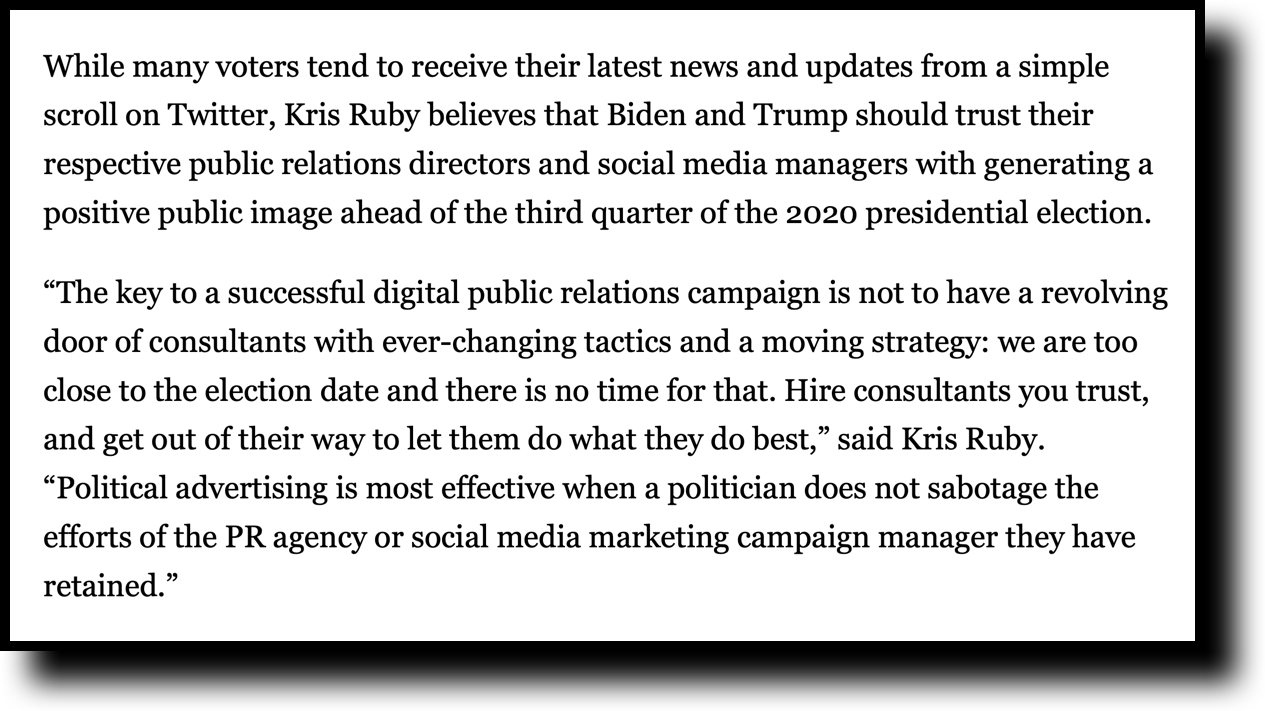
If I was hired as the director of social media and public relations for a political candidate running for office, I would only accept the job under one condition:
Hire me to do what I am best at and do not get in my way. When you hire people with subject matter expertise and then do not follow their advice or have a revolving door of political consultants, nothing can ever gain traction, regardless of how brilliant a campaign idea is.
If people do not trust the consultants they hire for PR or social media, it will always end in disaster rather than success, because they will undermine their efforts.
Public Relations is an area where people hire consultants and still question their advice. When you hire a doctor, you don’t fight with the doctor. When you go to the dentist, you don’t tell the dentist how to do mouth surgery or fill a cavity. If you hire a PR consultant, let them do their job. If you hire a social media director, don’t put out a tweet that could potentially unravel months of campaign strategy and ideation.
As agency owners, we spend months crafting messages or creative graphics for one social media post. If I lay out a plan on how to attract voters in the 18-25 category but you tweet something that derails that plan, what good is the social media campaign you hired me to create? Political advertising works if the politician lets it work and doesn’t sabotage the efforts of the agency or campaign manager. If I create an amazing campaign for you on how to use Instagram filters or advertise on podcasts to reach millennials but you tweet something that is insulting to a different demo, the dollars will ultimately be wasted because a new fire has to be put out.
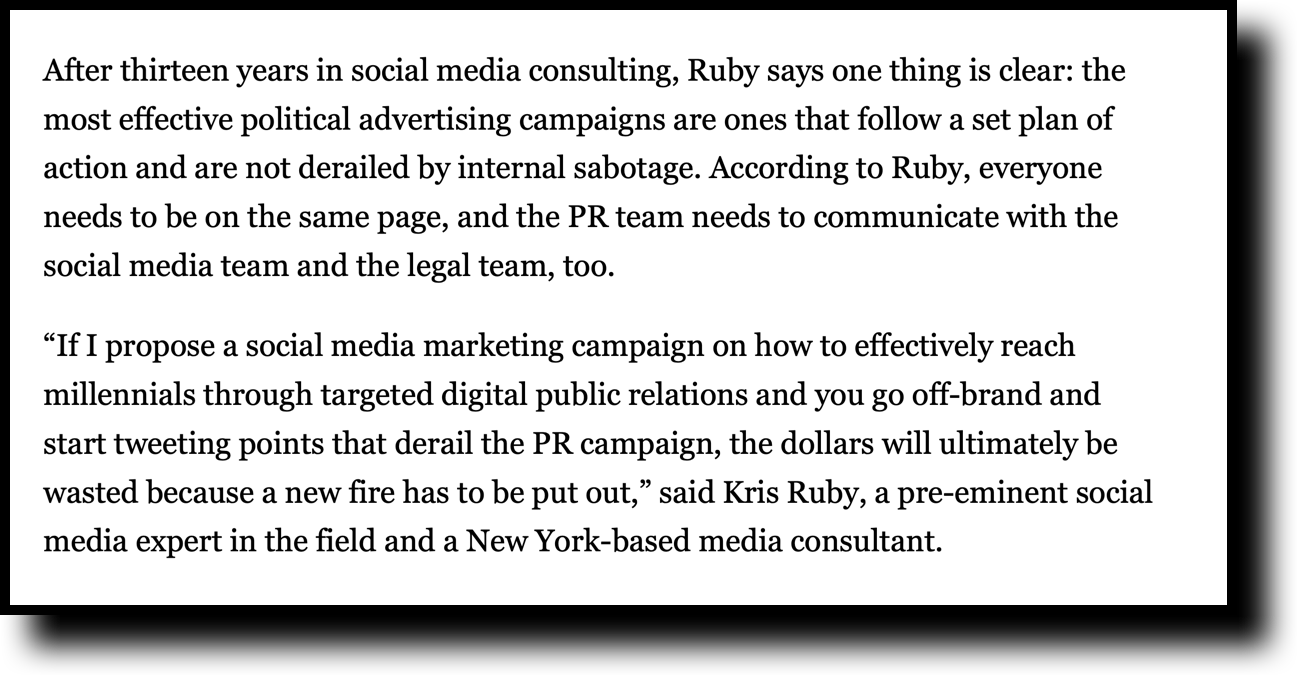
NY POLITICAL CONSULTING FIRM | POLITICAL STRATEGY
Do you need help with social media marketing services for a local political campaign strategy?
Ruby Media Group is a New York Based Public Relations, Political Communications, Crisis Communications, and Personal Branding Firm. RMG can help you with a political campaign, public relations communications, and conservative PR campaigns.
Ruby Media Group specializes in national and local political publicity campaigns, media relations, and political consulting. We have garnered successful results for both political and corporate clients across the country and internationally for over 15 years. Kris Ruby is a fixture in the cable news arena and is a political commentator and frequent media contributor on national TV networks. She also runs the #1 political club on Clubhouse with newsmakers and political pundits.
Campaigning isn’t only for Politicians.
Every politician runs on a tagline promising hope for a better future. For example, some famous political taglines include, ‘Make America Great Again. Change We Need. A Time for Greatness.’ Publicists at Ruby Media Group can help you create a slogan for your business or run for office. What future can you promise your constituents, patients, and clients? Leave it to the PR pros at Ruby Media Group to create the vision for your future political campaign.
Digital marketing services for political candidates | Social media campaigns for politicians
Reach voters. Persuade donors. Secure media coverage.
Traditional models of political advertising are becoming obsolete. Hire Ruby Media Group to create a next-gen political communications strategy.
RMGs services include:
- Campaign strategy for Facebook, X, Instagram ads
- Social media political campaign strategy
- Social media execution for political campaigns
Political campaign strategist with expertise in social media content, PR, earned media, owned media, SEO, and content strategy.
ABOUT THE AUTHOR
MEDIA CONSULTANT | POLITICAL ADVERTISING STRATEGIST | NYC
Kris Ruby of Ruby Media Group is a frequent commentator on Fox News. She reports on Facebook, Twitter, Google, and Big-Tech Privacy Concerns.
Ruby is a Political Campaign Social Media Expert. She is the CEO of Ruby Media Group, a Public Relations and Social Media Agency based in New York City. Kris Ruby is a seasoned political campaign strategist with experience running social media campaign ads. Ruby is a frequent social media commentator on national news outlets to discuss the role of social media in US presidential elections and how candidates utilize social media marketing platforms to win voters in real-time.
RECENT MEDIA INTERVIEWS ON SOCIAL MEDIA POLITICAL ADVERTISING:
Newsmax: Political campaign strategist Kris Ruby on Mike Bloomberg’s Social Media Marketing strategy.
International Policy Digest: Is It Time for Trump and Biden to Work Harder to Attract the Gen Z and Millennial Vote?
Kris Ruby Reports: An investigation into social media disinformation in 2020. How Twitter used natural language processing in content moderation.
RESOURCES:
Federal Election Commission Campaign Finance Data
FCC political advertising rules
Political Content on Social Media Report: Rules of Audience Engagement for Commercial Advertisers During an Election Year
*Date last updated: December 2024
No Generative AI Training Use
Ruby Media Group Inc. reserves the rights to this work and any other entity, corporation, or model has no rights to reproduce and/or otherwise use the Work (including text and images on this website) in any manner for purposes of training artificial intelligence technologies to generate text, including without limitation, technologies that are capable of generating works in the same style or genre as the Work. You do not have the right to sublicense others to reproduce and/or otherwise use the Work in any manner for purposes of training artificial intelligence technologies to generate derivative text for a model without the permission of Ruby Media Group. If a corporation scrapes or uses this content for a derivative model, RMG will take full legal action against the entity for copyright violation and unlicensed usage.
KRIS RUBY is the CEO of Ruby Media Group, an award-winning public relations and media relations agency in Westchester County, New York. Kris Ruby has more than 15 years of experience in the Media industry. She is a sought-after media relations strategist, content creator and public relations consultant. Kris Ruby is also a national television commentator and political pundit and she has appeared on national TV programs over 200 times covering big tech bias, politics and social media. She is a trusted media source and frequent on-air commentator on social media, tech trends and crisis communications and frequently speaks on FOX News and other TV networks. She has been featured as a published author in OBSERVER, ADWEEK, and countless other industry publications. Her research on brand activism and cancel culture is widely distributed and referenced. She graduated from Boston University’s College of Communication with a major in public relations and is a founding member of The Young Entrepreneurs Council. She is also the host of The Kris Ruby Podcast Show, a show focusing on the politics of big tech and the social media industry. Kris is focused on PR for SEO and leveraging content marketing strategies to help clients get the most out of their media coverage.
